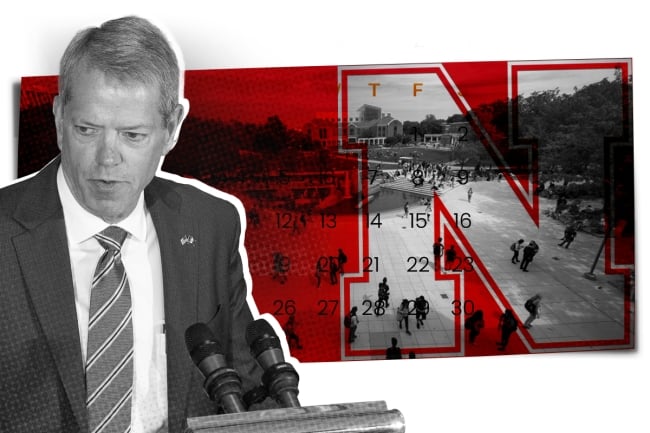You have /5 articles left.
Sign up for a free account or log in.

Pillen has taken issue with the search timeline for the next University of Nebraska president. The Board of Regents could name a priority candidate today.
Justin Morrison/Inside Higher Ed | Jim Watson/AFP/Getty Images | Craig Chandler/University of Nebraska
With the search for the University of Nebraska’s next president stretching into its seventh month, the Board of Regents is coming under mounting pressure from Governor Jim Pillen to make an appointment already.
Today, the board seems poised to do just that. A meeting scheduled for this morning includes an agenda item indicating that regents will likely designate a “priority candidate” as the system’s next president. The move comes in the wake of criticism from Pillen and a reported deadlock among the regents, with local media reports indicating that the eight board members are split over two candidates.
Pillen, a Republican and a former member of NU’s elected Board of Regents, has raised concerns about the lengthy timeline for the search as well as the loss of athletic director Trev Alberts, a former Nebraska football star, who recently departed after less than three years to take the same job at Texas A&M University. Pillen has blamed the loss of the homegrown hero on Nebraska’s lack of permanent leadership, calling on the Board of Regents to act fast to fill the presidency.
“It has been 206 days since Ted Carter announced his departure as president. It is unacceptable that the University’s elected leaders have failed during this time to appoint permanent leadership. It is imperative that they act urgently and decisively to end this uncertainty,” Pillen said last week in a “call to action.”
Pillen has made clear his own priorities for Nebraska’s next president. He has urged the board to hire someone with Nebraska ties, who is willing to stay on the job for 10 years and who respects the values of conservative Nebraskans, the Nebraska Examiner reported. Some sources, the news organization noted, took the last point to mean someone who won’t advocate for diversity, equity and inclusion initiatives, which Pillen campaigned against when he ran for governor in 2022.
The Search Timeline
Frustrated by Alberts’ departure and the leadership void at the state’s flagship, Pillen has suggested NU’s presidential search should have been completed in 90 days.
Such expediency is rare in institutional leadership searches. And judging from the university’s past presidential searches, this one appears to be progressing on a normal schedule. If the University of Nebraska names a finalist today, it will be ahead of the timing for the last two presidential searches.
In a statement a university spokesperson sent to Inside Higher Ed, Board of Regents chair Rob Schafer defended the timeline, noting the length of the search is consistent with Nebraska’s hire of former presidents Hank Bounds in 2015 and Ted Carter in 2019.
“The search that resulted in President Carter’s selection took seven months. Before him, the search that ended with President Bounds’ selection lasted one year. I am confident that the Board is doing its proper due diligence in choosing the right person to lead us forward,” he said.
Schafer added that it was important for regents to “take the time” to find the best possible leader.
Pillen shouldn’t be surprised by the pace. This is now Nebraska’s third presidential search in a decade; as a regent from 2012 until he stepped into the governor’s office last year, Pillen was part of the two previous searches.
The governor did not respond to multiple requests for comment from Inside Higher Ed.
Nebraska’s timeline is also similar to those of its peers in the Big Ten athletic conference, which have regularly taken close to a year—or even longer—to select a new president. When Ohio State University President Kristina Johnson stepped down mysteriously in November 2022, it took OSU’s board until August to name its next president: none other than Nebraska president Ted Carter, who remained in Lincoln for a few more months before joining Ohio State in January.
Michigan State University also hired a new president late last year, tapping Kevin Guskiewicz of the University of North Carolina at Chapel Hill for the role. He joined the university this month, replacing former MSU President Dr. Samuel Stanley Jr., who resigned in October 2022 amid a clash with trustees over Title IX issues.
At the University of Minnesota, a presidential search just wrapped up after nearly a year. In April, President Joan Gabel left to become chancellor at the University of Pittsburgh. Late last month, the U-M Board of Regents announced Rebecca Cunningham as the university’s next president.
Contenders Emerge
Amid Pillen’s criticism of the search timeline, names of reported finalists surfaced last week.
The Nebraska Examiner named Jeffrey Gold, chancellor of the University of Nebraska Medical Center, and Bryan Slone, president of the Nebraska Chamber of Commerce and Industry and a former Republican gubernatorial candidate, as the expected finalists for the position. The news outlet also reported that NU contacted Republican Congressman Mike Flood about the candidacy but Flood, who is running for reelection, reportedly did not express interest.
NU’s regents have reportedly been deadlocked in choosing between Gold and Slone.
Gold is the more familiar to the system, given that he has led UNMC since 2014 and holds the title of executive vice president and provost within the University of Nebraska system, making him the chief academic officer and a familiar face to the regents.
Gold did not respond to a request for comment from Inside Higher Ed.
By comparison, Slone is a more nontraditional presidential candidate. His experience in higher education is limited to almost three years as an executive in residence at the University of Nebraska-Lincoln School of Accountancy. An attorney and accountant, Slone also served on the Dean’s Advisory Board for the University of Nebraska College of Business.
Slone did not respond to a request for comment from Inside Higher Ed.
Pillen may have his own list of priorities, but the Board of Regents, which has the final say on the hire, has also developed a profile of desired traits for the next president. The regents are looking for a candidate who aligns with eight “core leadership pillars,” including proven leadership, strategic thinking, devotion to the state, political acumen, fundraising capability, commitment to diversity and inclusion, interest in global leadership and an appreciation of college athletics and academic health science centers.
Whether other candidates are actively being considered remained unclear as of publication. Since January, NU has been led by Interim President Chris Kabourek, senior vice president and chief financial officer for the University of Nebraska system. But Kabourek “did not apply for the position as a condition of being named interim,” according to NU spokesperson Melissa Lee.
If regents name a priority candidate today, a hire will likely follow at April’s board meeting after a required 30-day public vetting period. (Update, March 20, 12:20 p.m.: At this morning's meeting, the regents named Gold as the priority candidate.)
Regardless of who it is, the next president will be tasked with carrying out an ambitious effort that Carter launched to return the University of Nebraska-Lincoln to the Association of American Universities after it was voted out in 2011 for failing to meet membership criteria around research funding. That effort is already underway, but it will be up to Nebraska’s next president to drive it home—in addition to hiring a new athletic director in a state where college athletics reigns supreme, and where a former-regent-turned-governor is watching his former colleagues with a close and critical eye.








